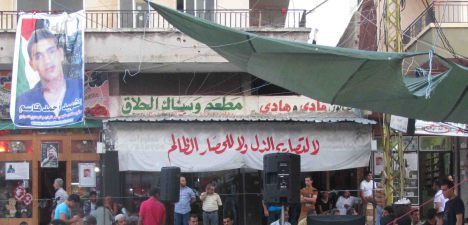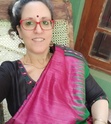Marcy Jane Knopf-Newman's Blog, page 7
June 27, 2012
رأي من وحي نهر البارد: اللاجئون الفلسطينيون- حقوق مسلوبة وكرامة مهدورة
 Reblogged from Nahr el Bared - نهر البارد:
Reblogged from Nahr el Bared - نهر البارد:
أثارت حادثة قتل فلسطينيين في مخيم نهر البارد (شمال لبنان) قضية هؤلاء اللاجئين الموزّعين في بعض البلدان العربية، الذين يعانون من الحرمان من الهوية، والتمييز في المعاملة، والذين يتعرّضون للتنكيل بسبب ضعف الاندماج الاجتماعي في بلد أو آخر، أو بسبب بعض الاضطرابات التي شهدها هذا البلد أو ذاك.
ربّما يشفع لهؤلاء اللاجئين أن قضيتهم هي على تماس مع قضايا المستضعفين والمهمّشين الآخرين في المجتمعات العربية، من مثل الأقليات الإثنية والنساء والمعدمين وسكان العشوائيات والأطراف، إلا أن خصوصيّتهم تكمن في اعتبارهم بمثابة جماعة بشرية فائضة عن الحاجة، وغير مرغوب بها، ويحبّذ التعامل معها باعتبارها قضية أمنية، في ذات الوقت الذي يجري فيه توظيف قضية فلسطين في المزايدات والتجاذبات السياسية، في تمييز مفضوح بين القضية وشعبها.
اعتصـام شبـاب نهر البارد فـي يومـه العـاشـر
 Reblogged from Nahr el Bared - نهر البارد:
Reblogged from Nahr el Bared - نهر البارد:
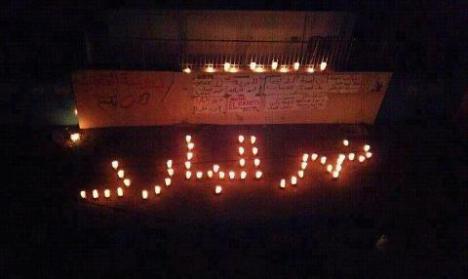
السفير – 26.06.2012
إسماعيل الشيخ حسن
يستمر شباب «ساحة تحرير مخيم نهر البارد» باعتصامهم المفتوح… يلتف حولهم أهالي المخيم، يثنون عليهم ويشجعونهم، فقد حققوا خلال بضعة أيام ما فشلت في تحقيقه الفصائل الفلسطينية و«الأونروا»، و«لجنة الحوار»، وعشرات العشرات من الهيئات، واللجان، والمؤسسات، والسفارات، في خمس سنين مضت.
بتحركهم، أعادوا لأهالي المخيم كرامتهم وإحساسهم بالأمل وبقدرتهم على تغيير واقعهم. أعادوا إعمار مجتمعٍ قد تشتت بفعل تدمير مخيمه، وعلاقات اجتماعية واقتصادية تقطعت بفعل إنشاء جدران وحواجز وتصاريح عسكرية، ومبادرات أهلية تفتتت من جراء انقسامات فصائلية فلسطينية.
Free the refugees of Nahr al-Bared
My article online today on the Al Jazeera English website:
Tripoli, Lebanon - Last week at a candlelight vigil in Baddawi refugee camp for the camp’s dead and injured, signs posted on the school wall asked why, after five years, was Nahr al-Bared still a closed military zone?
For the past five years, all entrances to Nahr al-Bared have remained encircled by the Lebanese army. It has remained that way since the military’s 2007 campaign – ostensibly against Fatah al-Islam members – devastated the camp, turning it into a closed military zone. In addition to the checkpoints, walls and barbed wire, the army commandeered all the homes surrounding the periphery of the camp, in addition to those homes straddling the border between the old and new sections of the camp.
Those wishing to visit friends in the camp must first obtain permission from the army (and those who are US citizens must wait for the army to clear visits with the US embassy). Palestinians from other camps, including those who lived in Nahr al-Bared prior to the army’s bombardment, are also prevented from visiting the camp. Thus, people in other camps cannot visit their relatives in Nahr al-Bared without prior permission from the military.
This closure also affects the economy of the camp, and the economy of the area, since Nahr al-Bared used to be an economic hub connecting Palestinians in the camp with Lebanese people in the villages surrounding it.
Inside the camp, 600 families continue to live in zinc army barracks containers, which are like ovens in the summer and refrigerators in the winter. Those whose homes have been repaired or rebuilt did so on their own, without relying on outside help. Most of the camp remains in ruins, with promised funds for rebuilding not materialising; the Lebanese government and UNRWA are reportedly complicit in stalling the arrival of those funds by preventing people from returning and by controlling the terms of the camp’s resurrection.
The spark
And, on top of all this, Palestinians’ freedom of movement is restricted through a system of identification cards – both inside and outside the camp.
On June 15, the Lebanese army’s stopping of a motorcyclist to check his identity card inside the camp escalated into an argument. The soldiers proceeded to his home, where they dragged him into the street and beat him. When other youths gathered, the army sprayed the area with gunfire and a bystander, 16-year-old Ahmad Qassim, was shot in the head and killed.
Palestinians in Nahr al-Bared mobilised. Qassim’s death was the spark that ignited people to take to the streets to fight for the end of their imprisonment. This time, Palestinians took over some of the buildings controlled by the army that separate the two sections of the camp. It seemed as if this could have been the beginning of an effort to “take back” the entirety of the camp.
In solidarity with Nahr al-Bared, and to fight their own imprisonment in similar camps, Palestinians in Ein el Helwa and Rashadiyeh camps in southern Lebanon also rose up to fight for their rights. Two Palestinians were killed: Khaled Youssef in Ein el Hewla and Fouad Loubani in Nahr al-Bared.
These protests and clashes with the army are ongoing, with residents of Nahr al-Bared creating their own Tharir Square-style sit-in protest. Unlike Cairo’s famed square, however, this protest is taking place in a closed military zone, away from the lenses of the world’s TV cameras. Indeed, filmmaker Sandra Madi was arrested (and later released) on Monday, while trying to film images of the protest, to share them with the outside world.
It feels like deja vu. It feels like the Lebanese army is the modern-day version of maktab thani (Deuxieme Bureau, France’s former external military intelligence agency), suppressing Palestinians in the camps. But in 1969, during the Palestinian Revolution in Lebanon, Palestinians in Nahr al-Bared, surrounded by the Lebanese army, were the first to liberate their camp from this repressive military regime. This week a similar pattern played itself out. Palestinians in Nahr al-Bared, who have been living in what is a closed military zone, fought to free themselves.
Fighting for freedom
This time, the Palestinians are largely fighting for their freedom on their own. Since June 15, hundreds of youths in Nahr al-Bared have been holding sit-in demonstrations, demanding an end to military rule in the camp, including the requirement to show identity cards to enter and exit their own community. Beyond this, they are demanding a full investigation of Qassim’s death, the removal of the army from public spaces such as the cemetery, and allowing the media to report freely on what happens in the camp. Meanwhile, Palestinian factions are negotiating with the army.
But the camp remains a closed military zone.
One of the reasons Palestinians demand access to journalists is that stories are once again circulating in the Lebanese press that remind one of 2007, when the army’s crusade against Palestinians was rationalised through a “war on Fatah al-Islam”. The general public has little to no access to information or images from the camp itself, and can accept these ideas too readily.
One wonders, for instance, why formerly armed fighters, identified as Fatah al-Islam members, were released from prison at the same time Palestinian prisoners were also released, and while Nahr al-Bared is resisting its besieged conditions. In the absence of journalists present to observe the sit-in – and the events leading up to it – the media is conflating ideas and making a scapegoating of an “Islamic militia” to justify the army’s potential destruction of yet another Palestinian refugee camp in Lebanon. It foments jingoistic sentiments in the population, and, in Lebanon, it is the Palestinians in the camps who suffer accordingly.
Falling victim to these conspiracy theories about Fatah al-Islam, or any other militia foreign to the camp, misses the root of the problem. Palestinians are fed up with a besieged existence, and want the right to live and move about freely – both within and outside their camp.
What happened this week was no different from an uprising in a prison, with prisoners demanding their rights – except, in this case, the imprisoned are an innocent civilian population that has not been arrested or convicted of any crime. Palestinians are demanding basic human rights, demanding to live their lives with dignity. To spin it any other way is to perpetuate racism against the Palestinian people.
Marcy Newman is a scholar, a teacher and an activist. She is the author of The Politics of Teaching Palestine to Americans.
Follow her on Twitter: @marcynewman
Filed under: Lebanon, Militarization, Palestine, Refugees








June 24, 2012
مشاهد من اليوم التاسع والعاشر للإعتصام في نهر البارد - Scenes from the 9th and 10th day of Nahr el bared Sit-In
 Reblogged from Nahr el Bared - نهر البارد:
Reblogged from Nahr el Bared - نهر البارد:
من شعارات الإعتصام – Slogans from the Sit-In
جمع التبرعات من أهالي المخيم لدعم الإعتصام المفتوح – Collecting donations from Camp-Community in support of the Sit-In
June 23, 2012
Nahr el Bared Redux
Yet again the Palestinian refugee camp Nahr el Bared is under attack. For those of you who don’t know this history, click here for a link to an article I wrote detailing it up until 2008. I have been reposting information from two blogs, Words of Actionand Nahr el Bared - نهر البارد because the former is written by a journalist who is witnessing what is going on and the latter is collected from people who are in the camp. In these repostings there have been videos from the Solidarity Palestine Youtube channel, which are videos posted from the camp, including interviews with the martyr Ahmed Qassim who was murdered by the Lebanese army last week. After going up to Baddawi camp a couple of times last week and meeting friends across the street from Nahr el Bared camp (because although they army was allowing women in that night, I was with a Palestinian friend from another camp who was not allowed in), I also wrote something, but I am waiting for it to be posted online before sharing it. But the most important and best article I’ve seen yet is an article that was published in al-Akhbar yesterday and I’m posting it in full below in the hope that as many Lebanese people as possible will read it given how many lies and much misinformation circulates whenever Palestinians and the army are the subject. In Lebanon, the army is believed by many people to be above criticism. And in many parts of Lebanon Palestinians are the ultimate scapegoat. For those readers who are willing to have their stereotypes challenged, here is “Letter From a Camp Resident: The Reality of Nahr al-Bared,” which dismantles most of the most egregious stereotypes and misconceptions:
Published Saturday, June 23, 2012
Considering the misinformation and blackout in much of the media, and since the events were presented solely from the perspective of the main perpetrator in the crime of killing the innocent in Palestinian camps recently, I would like to state the following facts for those who are searching for the truth about what happened, and what is still happening, in the Nahr al-Bared Camp:
1. There have not been weapons in the Nahr al-Bared Camp since 2007, and it has been under military siege since then. The siege is so intense that no one can enter the camp – or leave it – except through the Lebanese Army. All the talk of confrontations proving the presence of weapons used by the Palestinians against the Army are lies, defamations designed to plant hatred in the hearts of our Lebanese brothers.
There have not been weapons in the Nahr al-Bared Camp since 2007, and it has been under military siege since then.
2. No Palestinian is allowed to enter the camp, even if he or she lives there, without securing permission from the Army. None of their relatives can visit them at the Camp without permission from the Army. This is because the Camp, since 2007, has been a militarized area, so military rules and regulations are applied there. Any Lebanese person, however, can enter the camp by simply presenting their personal identity card, even if they do not live in the Camp or even in Lebanon. Even the old cemetery [in the camp] is under military control, and entering it is only allowed on religious holidays and, even then, only with permission from the Army.3. The Lebanese Army can only open fire with the permission of a political decision, no matter against whom, as is the case in Jabal Mohsen and Bab al-Tabbaneh, even when the Army are under attack. We all saw how the Army stood by watching in Tariq al-Jdideh during the recent events. Yet, the Army needs no such political decision to open fire on Palestinians. The reason is quite simple: the Palestinians have no one defending them, even if only with words.
4. Let no one be convinced that merely throwing stones at the Army or shouting insults at the soldiers can justify their opening fire on a group of youths, the majority of whom were under the age of 20. And for those who do not know, the youth that was killed on June 15 in the Camp was only 16 years of age, and he was killed by a direct shot to the head. (He was just standing on a street corner in the Camp.) He also had wounds to the chest and heart. Another youth also died from similar injuries. And the other youth, who died in Ein al-Hilwe Camp, was not killed by a knife, as reported by LBC, but killed by a shot to the neck from an M16.
Excuse me if I have dragged on, but we are fatigued from years of humiliation and searches and oppression and besiegement in the Camps.
This article is an edited translation from the Arabic Edition.
Yousef Mohammed Ali is a Palestinian refugee from Tabaraya, living in Ein al-Hilwe Camp.
Below are photographs I took at a candlelight vigil for the martyrs in Nahr el Bared and Ein el Helwa camps (because the other camps subjected to the status of a closed military zone have joined in protests and sit ins since the the onset of this lastest attack on Palestinians by the army. The photographs are a bit blurry, but the signs on the wall demand the end to the status of closed military zone of all camps. Here are there other demands (also reposted below).
Anyone interested in learning more, please come to Nasawiya’s event this week about Nahr el Bared:
Live from Nahr el Bared نهر البارد يروي Public Event · By Nasawiya
In solidarity with the youth-led open sit-in ongoing in Nahr el Bared to end the military siege, we invite all activists, bloggers, and journalists for a night of discussion and learning with Palestinian activists.Come with all your honest questions, meet residents from the camp, and talk to them personally to understand why it is imperative to end the military siege.
The evening includes a visual exhibition open from 5pm – 10pm, as well as a panel of conversation with the Palestinian activists starting 7:30pm.
تضامنا مع الشباب المعتصمين في مخيم نهر البارد ومطالبهم المشروعة المتمثلة بإنهاء الحكم العسكري في المخيم ووقف اعتماد نظام التصاريح، تدعو المجموعة النسوية جميع النشطاء والصحافيين والمهتمين للمشاركة في اليوم التضامني هذا. يتخلله عرض صور وأفلام قصيرة من الاعتصام وكذلك لقاء مع بعض الناشطين من المخيم القيمين على الاعتصام.
من المهم التعرف على وضع المخيم، وضع أهله، أين أصبح على صعيد إعادة الإعمار؟ هل ما تبثه وسائل الإعلام في نقلها للحدث من هناك صحيح؟ لماذا يجب فك الحصار العسكري؟…
تعالوا مع أسئلتكم من أجل نقاش صريح في شتى المسائل. ليكن يوما نتعرف فيه عن وضع اللاجئين الفلسطينيين في لبنان. ليكن يوما لنعيد التفكير في الكثير مما تشربناه من أفكار مسبقة ونمطية حول المخيمات واللاجئين في لبنان.
Date:
Wednesday, June 27, 2012
5:00pm until 9:00pm
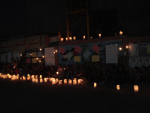
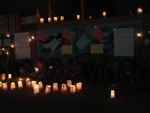
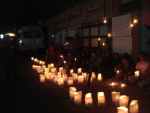
Filed under: Lebanon, Militarization, Palestine, Refugees, Resistance








دراسة تظهر إحدى خلفيات ما يجري في نهر البارد: المخيم بين حاجزي الأمن والقانون
 Reblogged from Nahr el Bared - نهر البارد:
Reblogged from Nahr el Bared - نهر البارد:
في دراسة بحثية لرنا حسن بعنوان “مخيم نهر البارد بين حاجزي الأمن والقانون” يظهر فيها ان المقاربة التي اعتمدتها السياسة الرسمية اللبنانية في مخيم نهر البارد قد تقود إلى احتمال ولادة نهج جديد في التعامل مع المخيمات والتجمعات الفلسطينية في لبنان يعتمد إجراءات أمنية مدججة بقوانين تمييزية. وهذه الدراسة التي نشرت في نهاية العام 2011 في مجلة الدراسات الفلسطينية تناقش حالة “المخيم الجديد” تحديدا حيث المنطقة التي جرت الأحداث الأخيرة فيها والتي أبتدأت بمقتل الشاب أحمد قاسم في المخيم قبل أسبوع برصاص أفراد من الجيش اللبناني. واللافت أن من مطالب الحراك المدني الشبابي في نهر البارد بعد حادث القتل هو تسليم أراض للسكان يضع الجيش يده عليها، فطالبوا في بيانهم بتاريخ 19 حزيران (يونيو) اضافة الى لجنة التحقيق وإلغاء التصاريح والحالة العسكرية: “تسليم كافة البيوت التي يسيطر عليها الجيش الى اهلها بعد ان حولها الى ثكنات عسكرية بالاضافة الى تسليم الملعب والبرايم A”.
وفي وقت سعى فيه الإعلام عموما إلى البحث عن أسباب بعيدة عن المخيم لمقتل شاب، ضمن عقلية المؤامرة السائدة والتي تدفع بها “الأفلام” التي تقوم بها أجهزة متنوعة بالعتم، علما أنه لم يجر تحقيق وتنشر نتائجه حول حرب نهر البارد، تظهر هذه الدراسة بوضوح إحدى الخلفيات الأساسية التي أدت إلى قتل الشاب، ضمن سياسة قمعية روتينية، ثم احتجاج الأهالي على سياسة إذلال أمنية وعنصرية مستمرة في مخيم نهر البارد.
Filed under: Palestine
رواية صحافية لبنانية عن مقتل فؤاد لوباني، حين لا يغطي الإعلام رواية القاتل
 Reblogged from Nahr el Bared - نهر البارد:
Reblogged from Nahr el Bared - نهر البارد:
كتبت الصحافية سناء الجاك روايتها عبر مقابلة عائلة الشهيد فؤاد لوباني، وهي رواية تظهر مدى المأساة حيث يسقط مدنيون برصاص قاتل بينما لا ذنب لهم أبدا، وهي تكرار لرواية عن الشاب أحمد قاسم أيضا الذي لم يكن بين صفوف الشباب المتظاهرة. المأساة الأكبر أن يلتف الإعلام حول رواية القاتل متجاهلا رواية القتيل
هذا هو ما كتبته الصحافية على صفحتها الفيسبوك
June 22, 2012
رأي: نهر البارد أو كيف تصنع «غيتو» وتبيّت لغماً
 Reblogged from Nahr el Bared - نهر البارد:
Reblogged from Nahr el Bared - نهر البارد:
نهلة الشهال- جريدة “السفير”، 22 حزيران
اللبنانيون، المثقلون بقلق ما يجري في سوريا وتأثيراته المتعددة عليهم، والمسحوقون بأزماتهم المعيشية الكبرى، يبدون غير مكترثين لذلك الحادث في مخيم نهر البارد للاجئين الفلسطينيين حيث وقع قتلى وجرحى بسبب إطلاق الجيش اللبناني النار على محتجين فلسطينيين. هذا الفعل يتكرر بصيغ مختلفة وعلى يد فاعلين مختلفين كل يوم في لبنان، فأين الغرابة؟ ثم، من المعروف أن المضطهَد والعاجز يستسيغ وجود من يفوقه ضعفاً لينكِّل به، فيشفي بتلك الطريقة المرَضية والمنحرفة أوجاعه هو نفسه.

